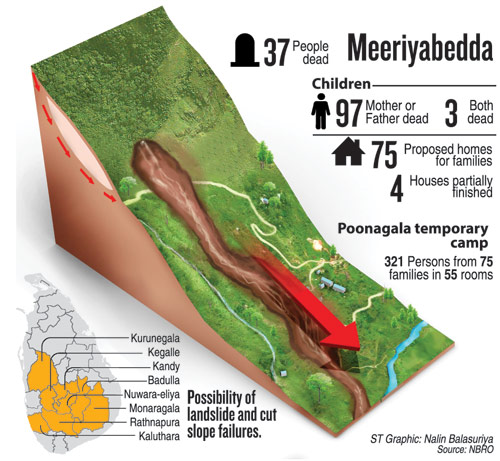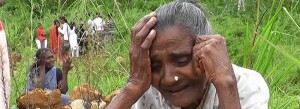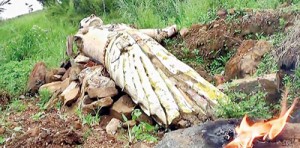News
Landslide warnings mean little to those who have no place to run
As fresh warnings of landslides continue to be issued, most affected plantation workers are struggling to find safe accommodation with no alternatives offered to them, workers and officials said.
The latest warning was issued on Friday for eight districts. The warnings said there could be landslides in the Monaragala, Badulla, Nuwara Eliya, Kandy, Kalutara, Kurunegala and Ratnapura districts.
Even though this was simply an early warning of earthslips, if the rain continues people should be careful, National Building Research Organisation (NBRO) Research and Risk Management Division head R.M.S Bandara said.
He said that the warning covered all the landslide-susceptible areas previously identified by the NBRO in the eight districts, including mountainous areas, manmade cut slopes and roads.
Unfortunately, however, the warnings are ineffective at times when there are no alternative arrangements in place, even for temporary accommodation.
People are forced to find their own solutions. Thangaraghu Sooriyapragasam, a father of three living in line rooms on the Thilary Estate in Dickoya, has been taking his whole family to a relation’s house in the nights.
“Following the NBRO warning, two families in our estate shifted to other places but the rest are still there because we have nowhere to go. We just work at the estate in the daytime and go to safer places at night,” he said.
He said that the plantation companies have failed to ensure the safety of workers, with no arrangements made to relocate them until the danger recedes.
“All of my five family members live in one small room, in great difficulty. During the rainy seasons our situation gets worse because of the danger of landslides. Sometimes we don’t know what to do,” he said.
N.K.R. Seneviratne, a geologist attached to the NBRO district office in Badulla, said the NBRO’s responsibility was to give necessary recommendations on the current weather pattern and emerging dangers but not to relocate people to places of safety.
“It is up to the Divisional Secretariats to act in co-ordination with the respective District Secretarias to carry out those activities and make sure that people in the danger-prone areas are safe. We can only make recommendations of the selected places,” he said.
 Mr. Seneviratne said the Badulla district office has issued warnings of landslides and cut-slope failures in the Haliyella, Uva Paranagama and Bandarawela areas. “If the rain continues for the next 24 hours, there would be a much greater possibility of risk,” he said.
Mr. Seneviratne said the Badulla district office has issued warnings of landslides and cut-slope failures in the Haliyella, Uva Paranagama and Bandarawela areas. “If the rain continues for the next 24 hours, there would be a much greater possibility of risk,” he said.
Usually the respective Grama Sevaka reported to the Divisional Secretariat if there were any such threats of landslides occurred in his area.
That information is redirected by the District Secretariat to the NBRO district office for further examination and study of the issue.
Badulla Additional District Secretariat (AGA) Gamini Mahindapala said the Secretariat had sought permission from the Lands Ministry to acquire state lands to resettle people displaced from the estate.
“Following the information collected from each Divisional Secretariat in the district and the Lessons Learnt and Reconciliation Commission (LLRC) recommendations over acquiring state land for people, we have sent a proposal to acquire state lands and some lands given to plantation companies to ensure safer places for the people who are displaced,” he said.
The Director-General of the Disaster Management Centre (DMC), L.B.R Mark, said his organisation and the Department of Meteorology, along with other government officials, were engaged in effective co-ordination to evacuate people residing in danger-prone areas.
He said from the information collected at grassroots level, they had collectively identified places of safety and brought them to the attention of community leaders to evacuate people if the necessity should arise.
“We have had awareness programmes to show the public how to face a landslide situation or other threats in the environment. We are trying our best to reduce human loss in these kind of natural disasters,” he said.
Meeriyabedda refugees still wait for homesThe 75 families affected by the Meeriyabedda landslide last year in which 75 people were buried alive are still in temporary camps facing many difficulties.  Remembering a loved one Currently, 321 persons from 75 families are living in an abandoned tea factory in Poonagala, Makanda. The former tea factory is divided into 55 rooms to house them until new houses are built. Among the survivors, 97 children lost parents So far, four houses have been completed and by end of January all the families will be resettled in new houses, Haldummulla Divisional Secretary Y.K. Shiromi Geevamala said. “All the necessary facilities have been provided to them including dry rations, healthcare, and electricity. The department spends Rs. 104,000 every week to look after them,” she said. The new houses are being constructed by the military along with the Urban Development Authority (UDA), Badulla AGA, Mr. Mahindapala said, adding, “At least 1000 soldiers are engaged in the task now”. He agreed that there were some delays in the past in construction due to the shortage of raw materials such as cement blocks and transport of materials to the area but those issues had been rectified and the houses would be completed in January. Last week, on the first anniversary of the Meeriyabedda landslide, the refugees in the Poonagala camp staged a protest in Bandarawela urging the government to resettle them in new houses. S. Sivapragasam , Director of Human Development Organisation, an NGO based in Kandy, said plantation companies had failed to protect workers facing such threats. “What they focus on is human working power and production only: they do not worry about the wellbeing of the workers or the dangers they are being exposed to,” Mr. Sivapragasam said. “The government should step into this matter immediately and formulate a national plan of action to avoid more human loss,” he said. |

